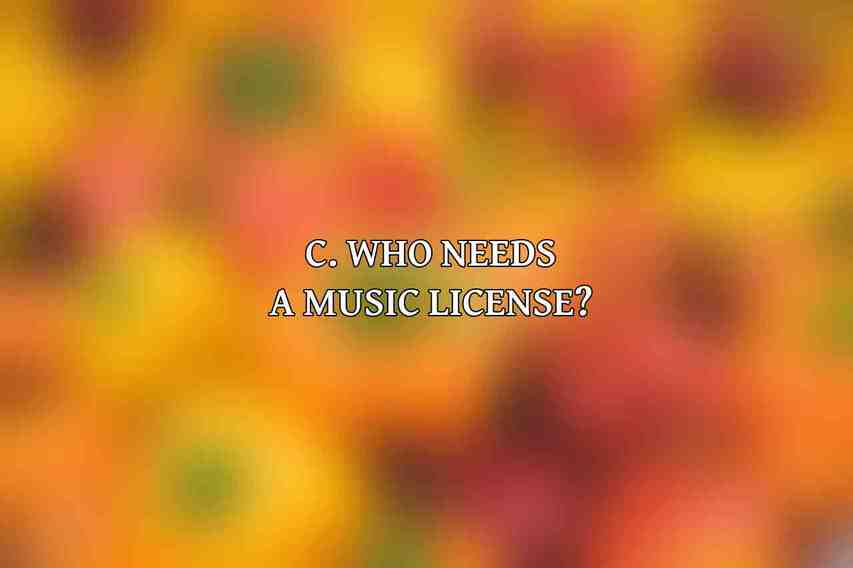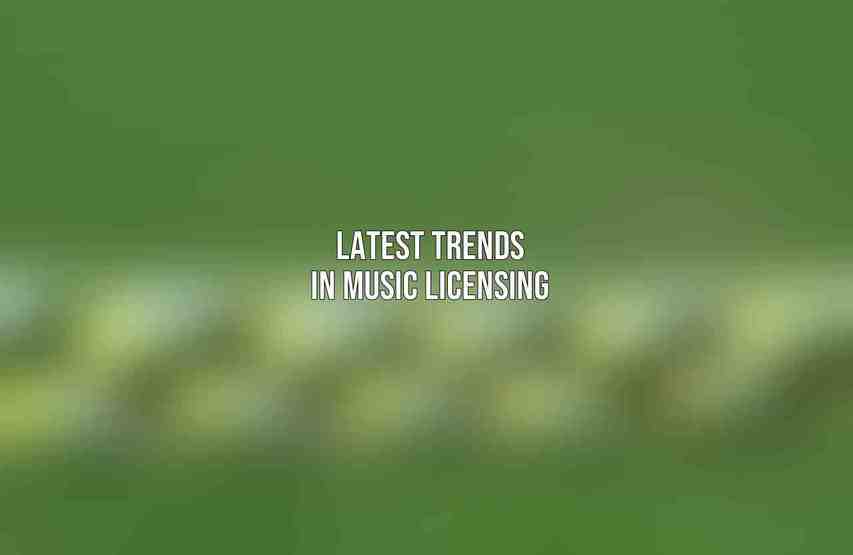Music licensing is the process of obtaining permission to use copyrighted music in various forms of media. It ensures that the composers, artists, and copyright holders are compensated for the use of their creative work while also protecting the rights of the creators. Music licensing is crucial in this digital age to avoid copyright infringement and legal issues.
A. What is Music Licensing?
Music licensing involves granting permission for the use of music in different formats such as films, TV shows, advertisements, video games, and live performances. It encompasses various types of licenses that specify the terms of usage and compensation for the right to use the music.
B. Why is Music Licensing Important?
Music licensing is essential for both music creators and users. For artists and composers, it ensures they receive fair compensation for their work and protects their intellectual property rights. For businesses and individuals using music, licensing helps avoid legal repercussions, ensures compliance with copyright laws, and provides access to a vast catalog of music for various projects.
C. Who Needs a Music License?

Anyone who wants to use copyrighted music in their projects or business activities needs to obtain a music license. This includes filmmakers, content creators, advertisers, event organizers, broadcasters, digital platforms, and more. Without the appropriate licenses, using copyrighted music can lead to costly legal disputes and penalties.
Types of Music Licenses
Music licenses come in various forms, each serving a different purpose and governing different rights. Understanding the types of music licenses available is essential for navigating the licensing process effectively.
A. Synchronization License
- Definition: A synchronization license allows the use of music in synchronization with visual media, such as film, TV shows, commercials, or video games.
- Usage: The music is synchronized with the visuals to enhance the viewer’s experience or convey a specific message.
- Duration: Typically, synchronization licenses are granted for a specific period or project.
- Cost: The cost of synchronization licenses varies depending on factors such as the popularity of the song, duration of use, and intended audience reach.
B. Mechanical License
- Definition: A mechanical license grants the right to reproduce and distribute copyrighted music in physical or digital formats, such as CDs, downloads, or streaming.
- Usage: It allows the recording, manufacturing, and distribution of cover songs or original music compositions.
- Duration: Mechanical licenses are usually granted on a per-use basis or for a specific number of reproductions.
- Cost: The cost of mechanical licenses is often based on the number of copies produced or sold.
C. Master Recording License
- Definition: A master recording license provides permission to use a specific recording of a song, typically owned by a record label or the recording artist.
- Usage: It allows the use of the actual sound recording in various media projects.
- Duration: The duration of a master recording license is negotiated between the parties involved.
- Cost: Costs for master recording licenses can vary based on the popularity and exclusivity of the recording.
D. Public Performance License
- Definition: A public performance license grants the right to publicly perform copyrighted music, whether live or recorded, in venues such as restaurants, bars, concerts, and radio stations.
- Usage: It covers music played in public settings for commercial or non-commercial purposes.
- Duration: Public performance licenses are typically issued on an annual basis or for specific events.
- Cost: The cost of public performance licenses is determined by factors like venue capacity, frequency of performances, and music usage.
How to Obtain a Music License
Acquiring a music license involves identifying the copyright holder, negotiating the terms of the agreement, and ensuring compliance with the licensing terms to avoid any legal issues. Discover our thoughts on Digital Art Licensing Strategies for Artists and Galleries in 2024
A. Identifying the Copyright Holder
- Searching online databases: Utilize resources like the American Society of Composers, Authors, and Publishers (ASCAP) or Broadcast Music, Inc. (BMI) to identify the copyright holders of specific songs.
- Contacting music publishers: Reach out to music publishing companies or rights organizations to secure the necessary licenses for the desired music.
- Hiring a music licensing agent: Consider enlisting the services of a music licensing agent who can assist in navigating the complex licensing process and negotiating agreements on your behalf.
B. Negotiating a Music License Agreement
- Key terms to consider:a. License fee: The amount paid to the copyright holder for using the music.b. Term of license: The duration for which the license is valid.c. Territory of license: The geographical area where the license applies.d. Usage rights: The specific rights granted by the license, such as performance, synchronization, or distribution.
- Tips for negotiating:a. Research comparable licenses to gauge fair pricing and terms.b. Be prepared to walk away if the terms are unreasonable or unfavorable.c. Get everything in writing to avoid misunderstandings or disputes in the future.
Music Licensing Strategies
Employing effective music licensing strategies can benefit both music creators seeking opportunities to license their work and individuals or businesses looking to use music in their projects.
A. Licensing Your Own Music
- Setting up a music publishing company: Establishing a music publishing entity can help manage the licensing and distribution of your music.
- Registering your music with a PRO: Register your music with a Performing Rights Organization (PRO) like ASCAP, BMI, or SESAC to collect royalties for public performances.
- Pitching your music to music supervisors: Present your music to industry professionals and music supervisors who oversee music selection for films, TV shows, and commercials.
B. Licensing Music for Your Projects
- Finding the right music library: Explore reputable music libraries and licensing platforms that offer a diverse selection of music for different projects.
- Negotiating a fair price: When licensing music for your projects, ensure to negotiate fair prices based on the scope of usage and budget constraints.
- Ensuring you have the proper rights: Verify that you have obtained all necessary licenses and rights for the music used in your projects to avoid legal complications.
Latest Trends in Music Licensing

Staying informed about the latest trends in music licensing can help industry professionals adapt to evolving practices and technologies shaping the music licensing world.
A. The Rise of Digital Music Licensing
The proliferation of digital platforms and online streaming services has led to new opportunities and challenges in music licensing. Digital music licensing now encompasses a wide range of online platforms, social media channels, and streaming services, requiring tailored licensing agreements to meet the demands of the digital age.
B. The Impact of Streaming Services on Music Licensing
Streaming services have revolutionized how music is consumed, leading to changes in how music licensing deals are structured and royalties are distributed. The shift towards streaming has influenced music licensing practices, revenue models, and the relationship between artists, labels, and streaming platforms.
C. New Technologies for Music Licensing
Advancements in technology, such as blockchain and AI, are increasingly being integrated into music licensing processes to streamline rights management, royalty distribution, and content identification. Blockchain technology, in particular, holds promise for enhancing transparency, security, and efficiency in music licensing transactions.
Resources for Music Licensing
Various resources are available to support individuals and businesses in navigating the complexities of music licensing and securing the appropriate permissions for using copyrighted music.
A. Music Publishers
Music publishers represent songwriters, composers, and music creators, managing the licensing and administration of their musical works. Collaborating with music publishers can facilitate the licensing process and ensure proper compensation for the use of copyrighted music.
B. Music Licensing Agencies
Music licensing agencies specialize in securing music licenses for various projects, connecting content creators with music rights holders, and negotiating licensing agreements on their behalf. These agencies play a crucial role in simplifying the licensing process and ensuring compliance with copyright laws.
C. PROs
Performing Rights Organizations (PROs) are entities that monitor, collect, and distribute royalties on behalf of songwriters and publishers for the public performance of their music. Registering your music with a PRO can help ensure you receive the royalties owed for the use of your music in public performances.
D. Online Music Licensing Platforms
Online music licensing platforms offer a convenient and efficient way to license music for various projects, providing access to a vast library of music tracks for synchronization, public performance, and other uses. These platforms simplify the licensing process, offering a diverse selection of music for different creative endeavors.
music licensing plays a pivotal role in the music industry, enabling creators to protect their intellectual property and generate revenue from their work while allowing users to access and utilize a wide range of musical content legally. By understanding the types of licenses, navigating the licensing process, implementing effective strategies, staying informed about industry trends, and leveraging available resources, individuals and businesses can successfully navigate the intricate world of music licensing in 2024.
Frequently Asked Questions
Is music licensing necessary for independent artists?
Yes, music licensing is crucial for independent artists as it ensures you have the legal right to use and distribute your music while protecting it from unauthorized use. Dive deeper into How to License Your Photography: A Comprehensive 2024 Guide
What are the different types of music licenses available in 2024?
In 2024, the main types of music licenses include synchronization licenses for film/TV, mechanical licenses for physical/digital sales, and performance licenses for live shows/venues.
What are some effective strategies for successful music licensing in 2024?
Some effective strategies for successful music licensing in 2024 include networking with music supervisors, creating a professional music portfolio, and staying updated on industry trends and licensing requirements.
How can artists negotiate favorable licensing deals for their music?
To negotiate favorable licensing deals, artists should understand the value of their music, be flexible in negotiations, and seek legal advice if needed to ensure fair terms are agreed upon.
What are some common pitfalls to avoid when dealing with music licensing in 2024?
Some common pitfalls to avoid in music licensing include not obtaining proper permissions/licenses, not keeping accurate records of licensed music usage, and not understanding the terms of licensing agreements before signing.

